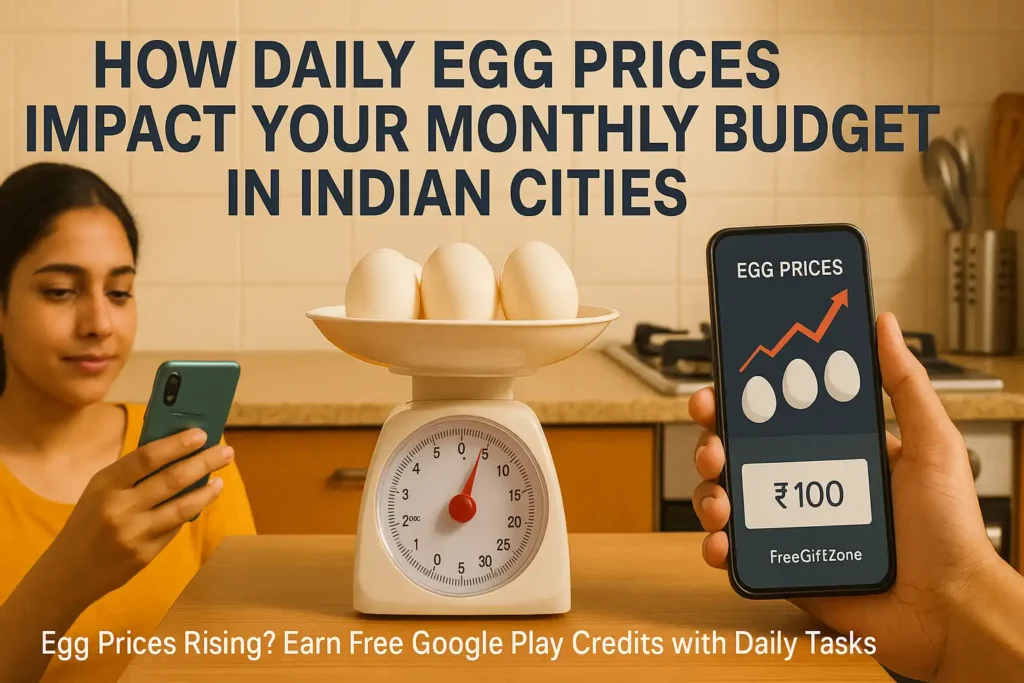If you are living in any Indian city, then you already know how fast food prices keep changing. One day, you see eggs at ₹5 per piece, and the next day, the same shopkeeper says ₹7. This small change looks like nothing at first. But if your family eats eggs every day, then it slowly starts affecting your monthly budget. That’s what is happening in most Indian homes today.

In the last few years, the egg rate has become something people check like petrol prices. It is no longer just a kitchen item. It is a budget item now. For middle-class families, especially those who live in cities like Delhi, Mumbai, Hyderabad, Bhubaneswar, or Lucknow, egg price changes bring a direct impact on food spending.
Why Egg Prices Keep Changing in Cities
Many reasons cause this change. Transportation costs are rising. Poultry feed is getting costlier. The weather also plays a role. And sometimes, demand increases in exam seasons or winters, which pushes the rates up.
When a family of five eats just two eggs per person each day, that means 10 eggs per day. If the rate increases by ₹2, then the family pays ₹600 extra in a month. This may look small, but when combined with other rising prices like milk, vegetables, and LPG, the pressure on monthly spending becomes very real.
Monthly Budget Plans are Getting Tougher
Earlier, families could fix a kitchen budget and manage it well. But now, with egg prices moving up and down, the grocery plan changes every week. Some families are reducing egg consumption. Some are shifting to cheaper protein sources. Some are visiting local mandis early in the morning to get eggs at a better rate. Others are looking for reward apps or cashbacks on delivery platforms.
People are trying everything to balance their spending because even ₹10 matters when the total household expenses are growing.
How People Are Now Saving With Free Online Rewards
In many cities, especially among younger families and college students, a new habit is spreading. After checking egg rates and making a shopping list, they open their phones and spend five to ten minutes on reward apps that give real credits for Google Play.
One such platform that people are now using is called FreeGiftZone. This is a reward-based site where users complete daily tasks like watching short videos, answering surveys, or playing games for a few minutes. In return, they earn coins that can be converted into Google Play redeem codes.
Some users even earn ₹50 to ₹100 Google Play balance and use it for small payments on apps like Zepto, Swiggy Instamart, or Paytm. A few use it to pay for YouTube Premium or OTT apps. Some students even redeem the balance for study apps or online classes.
You do not need to pay anything to use the FreeGiftZone App to get redeem codes. You only need to give some time and complete the tasks inside the app or website. Coins get added to your wallet, and once you reach the target, you can claim the redemption code. This small trick is helping families who want to adjust their spending but don’t want to give up on essentials.
Real-Life Example
Suhasini, a working mother from Nagpur, tracks egg prices every morning using her local mandi app. She says, “Some days the price is ₹6.50, and I avoid buying it. On such days, I spend time on FreeGiftZone and earn points. At the end of the week, I get ₹50 Google Play credit and use it on groceries during offers on BigBasket or on my son’s learning app.”
Many stories like this are now coming from Tier 2 cities, where people are using a mix of local price tracking and online saving tricks.
What You Can Do to Save Money Daily
If you are someone who checks egg prices daily to manage home costs, then here are a few things you can try:
- Buy from wholesale shops or local vendors early in the day
- Compare online delivery rates before placing orders
- Use reward-based platforms like FreeGiftZone to earn free gift cards
- Join Telegram groups or forums where users share coupon codes
- Set a fixed weekly grocery limit and adjust other items if egg prices are high that week
- If you use Google Play to recharge or pay bills, use the free credits to reduce actual spending
These small tips may not change your entire financial plan, but they will surely give you extra breathing space every week.
Final Thoughts
The increasing egg prices may feel like a small problem, but when you look at your full grocery bill, you realise how every item adds up. You cannot always control the market, but you can control your habits. Saving ₹10 every day may not feel big, but by the end of the month, it becomes ₹300. That’s a big deal for any family.
If you are already checking egg prices every morning, then take five more minutes to earn something useful too. Many people like you are already using FreeGiftZone to get Google Play redeem codes without spending a single rupee. You can try this too and use the credit on groceries, food apps, or anything else that runs on Google Play.